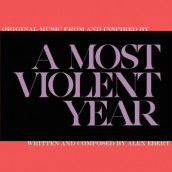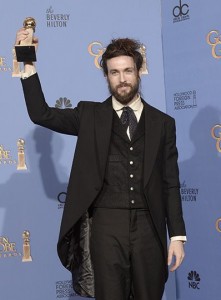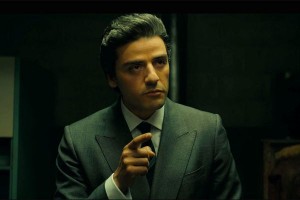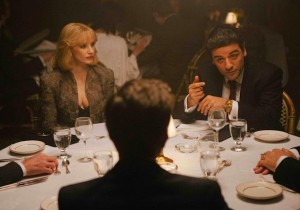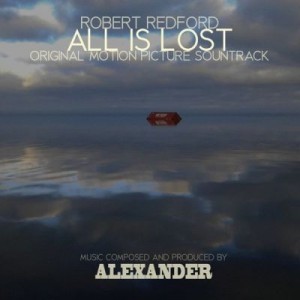A MOST VIOLENT YEAR (which just arrived on DVD and Blu-ray) might just be one of the most ironically misleading titles yet for a provocatively named film. For nothing in J.C. Chandor’s movie is what it appears to be, from the cargo heists endangering the heating fuel empire dreams of Abel Morales (Oscar Isaac in quietly burning Michael Corleone mode) to the insanely pacifist way in which he chooses to meet the thuggery that gets very close to home. But for all of the gritty photography, family business machinations and razor-sharp salty language that Chandor brings together to create a palpable feel of a 1981 NYC movie that Sidney Lumet never happened to make, perhaps no cinematic element flows more unexpectedly under Chandor’s hyper-intellectual surface than the spare, powerful score by Alex Ebert.
Pulsating synths, yearning brass, elegiac strings and even a WTF pipe organ create a mood of oil-black doom and tension, varying from near-subsonic suspense to conveying an elegiac epic worthy of a Mafia clan. Even a seven-minute chase near worthy of THE FRENCH CONNECTION rises from the car horn pitch of wheels-on-tunnel gravel to convey an inevitable sense of fate. This is a score that signals big, important stuff is going on, at once as retro electronic-y as an 80s-era crime score, while having a truly weird, unnerving alt. score sound, This is the most potent, and unusual approach to seemingly bad men since Faith No More’s Mike Patton used an operatic approach for the multi-generational crime saga of THE PLACE BEYOND THE PINES.
Here you’re also given the feeling of listening to the work of someone who seems to be alien to the nature of film scoring – yet in the coolest of ways. So it’s no surprise then that Alex Ebert hails from that same musical tribe, with his alt. street cred coming from the progressive bands as Ima Robot and the Ziggy Stardust-esque alter ego of Edward Sharpe and the Magnetic Zeros. The son of a therapist and actress whose family’s creative roots hail back to A MIDSUMMER NIGHT’S DREAM director Max Reinhardt, Ebert had his songs featured in THE DEADLIEST CATCH, CHUCK and BREAKING BAD along with a documentary score to MY BIG BREAK when his innovative music caught the ear of director J.C. Chandor. The son of an investment banker, Chandor parlayed his own knowledge of the predatory financial world into the acclaimed indie MARGIN CALL (scored by Nathan Larson). Music would be even more essential to Chandor’s next, singularly ambitious and near dialogue-free film with 2013’s ALL IS LOST, which pitted Robert Redford against the elements as a self-made sailor who truly discovers what it is to be alone.
Billing himself as “Alexander,” Ebert won a Golden Globe for his impressively innovative score that veered between orchestral tradition and alt.-honed experimentalism to convey a man against nature in all of its sonically beautiful, and threatening glory. It was truly a breath of fresh musical air in the mist of a lot of water, giving the sense of something new on the scoring horizon, even as melodic hope relentlessly faded to almost Zen-like musical effect. Now given the far wider environs of YEAR‘s grungy shipyard, a glass-filled house embodying The American Dream and the dank corridors of D.A. power, Ebert creates a focused sense of restraint that really wants to do some damage, yet keeps its potential for harm mostly honed in to seething, emotional effect that recalls the paranoid works of such classic conspiratorial musical auteurs as Michael Small (THE PARALLAX VIEW ) and David Shire (ALL THE PRESIDENT’S MEN), not that Ebert has really heard of them. For this is one composer who’s his own, impressive man as his music tries to out-think menacing, near invisible forces out to destroy Abel. It’s a soundtrack full of palpable threat and a thirst for power that marks Alex Ebert as a composer out to bend his own rules with the way of doing movie score things, all as an anti-hero does his impossible best to avoid drawing blood in this gripping misnomer of a movie.
ASSIGNMENT X: I believe you started out studying film before you became a musician.
ALEX EBERT: I got into music at the age of seven, and then into film when I was in my teens. And that’s all I was focused on until I was 22, when I got swept back into music. So it was sort of a sandwich. What I got out of it was the general cinema of one’s life – the epic moments that rest within the cracks of even the most mundane situations. It’s the cinema that exists within everyone’s mind, especially when I was a kid. My dad would drive us up to Monument Valley while blasting Vangelis, which would cause a certain story to unfold in front of me. It’s that combination of the visual and auditory that really defines what the cinematic experience is. You can even get it by listening to music as you’re walking through the airport. You’re in your own world, and you’re being transported to a place where everyone carries an ephemeral weight and existential dilemma. That idea of finding those “tracks” in the moments and putting yourself on the line translated over to my music making.
AX: What brought you and J.C. Chandor together?
EBERT: My music was put before him when he was considering composers for ALL IS LOST. He really took to it, and saw something in my music that would lend itself to composing. He said if was the “layers,” which was the composition and instrumental structure of my songs. They come and go, and reveal things.
AX: Though A MOST VIOLENT YEAR takes place in the far more expansive environs of NYC, as opposed to being confined to a sailboat in ALL IS LOST, you could say that both films deal with isolated men – both cut off from humanity, existentially or physically.
EBERT: Yeah, I think so. One guy is in a total world of ambition, and the other has a total lack of ambition, which is his ambition. But both have a panic circumstance and a ticking time clock. So they’re both character studies in a way.
AX: In contrast however, ALL IS LOST is a more expansive and melodic score, where you’ve taken a constrained, and almost experimental approach to A MOST VIOLENT YEAR.
EBERT: That film’s character of Abel Morales is intensely focused, almost in a trance. His whole attitude is very rigid and uptight. So both scores have that meditative quality in common. Abel’s eyes are half-closed, as he remains intensely focused on his capitalist venture. That kind of meditation leaks out onto the screen from Oscar Isaac’s performance, and I wanted to accompany that sort of leakage with an atmosphere that expands and surrounds us, bringing us into his meditative state.
AX: The title is exceptionally ironic, given that Abel really goes out of his way not to hurt, let alone kill anyone. It’s almost satirical in a way.
EBERT: It’s sort of the predicament of that era, where the American Dream meets violence, and the temptation of violence. So I guess I’d agree with you.
AX: You use a lot of low register, almost imperceptible music. What were your initial discussions with J.C. like to reach that approach?
EBERT: They were pretty vague. He’d talk about one inspiration or another, but it was really just the stuff that worked well with the meditation idea – that he was meditating his way through a problem. Abel is one of the most focused characters I’ve ever seen in a film. He never has an outburst or raises his voice much, even though the circumstances keep rising. He really tries to stay on edge the entire time. And so I tried to keep the music in that same vein. But at the same time, there’s the impending danger of the takeover of Abel’s ambitions, which gives an ominous tone to the movie. I wanted the score to prelude where it will all take him by the end of the film.
AX: How did you want to use brass in the score?
EBERT: It was just a hunch. I knew that I wanted brass in the score, though I wasn’t quite sure why at first. I used it in accompaniment with the orchestra. Primarily it was the lower brass, with whole notes and ominous tones, and even disharmonic sprawls of held notes that just sort of mashed the ears up. But then, I think the era of 1981 New York City just sort of feels brassy to me.
AX: A MOST VIOLENT YEAR has the most interesting use of the pipe organ in a movie this year next to INTERSTELLAR. I wouldn’t think of that instrument for a film like this.
EBERT: There’s something Dracula-esque about Abel to me. He’s built a Pandora’s Box of a castle. And trying to ascend it felt Dracula-esque. It’s an odd combination of ritualism and ambition. The only competition to Abel’s ambition is his own sense of morality, which is quite inflated as well. His idea that the driver’s shouldn’t be armed to protect themselves idea is taken to the point where he comes across as being a bit sociopathic and out of touch. It’s this weird inversion of morality gets the “Dracula” treatment as Abel’s sense of morality brings down the people around him.
AX: The big chase in the film reminds me a lot of THE FRENCH CONNECTION in just how long, tense and gritty it is. How did you want the music in “Close Haircut” to map it out, especially as it never plays like “action” music?
EBERT: I didn’t go back and revisit THE FRENCH CONNECTION – nor do I know if I’ve ever seen the entire thing. But in my mind, “The French Connection” was what I was going for. It was about letting the action, the footsteps and the breathing really sort of lead. And the sounds of the cars turning, the horns, the tunnel and all of that noise keeping us riveted. So I started with the main ingredient for the pasta. I think there had to be percussion of some kind. I knew I wanted horns. In fact, these “swirls” of horns and percussion were actually two separate pieces that we mashed on top of each other. I ended it with Abel’s theme, but finally in its full glory with the counter melody and all of that. The chase scene was fun to score because it was awfully long. It was a bit of project, but I’m really happy with the way it turned out.
AX: I think you could digitally insert Oscar Isaac’s performance into THE GODFATHER, and no one would notice that he’s taken Al Pacino’s place. Did you sense that J.C. was going for a legendary crime saga feeling here? And if so, how much of an epic sensibility did you want to give to the score to convey the birth of Abel’s home heating fuel empire?
EBERT: We were aware of that, and didn’t want to dive too deeply into that. I had several pieces that I wrote that didn’t end up in the film because they were a little too GODFATHER-esque. During the process, J.C. related this story about how art impacted life right after THE GODFATHER came out. What does every gangster start doing after they’ve seen it? They start acting like they’re in THE GODFATHER! They all started having dinner at these little Italian restaurants. So when Abel meets all of the other oil kingpins, in J.C.’s mind it’s them imitating THE GODFATHER, which is what he saw happening with the parents of the people he grew up around. So in that sense, THE GODFATHER‘s DNA is entwined with A MOST VIOLENT YEAR. It’s an interesting, odd and cool layer to the film.
AX: Though you’re never told exactly where Abel hails from, how much of his Spanish ethnicity did you want to reflect in the score?
EBERT: He’s a Spanish-speaking immigrant. While I never asked J.C. where he was from, I thought his accent was so slight, and so brilliant especially because it only really came out when he got mad. I thought that was really cool. So there was that thought that maybe I could bring a little bit of his roots into the score.
AX: Could you talk about your song “America For Me,” which ends the film?
EBERT: I live in New Orleans now, and had been watching a lot of Ken Burns’ jazz documentary, and digging it. When I first thought of J.C.’s movie, I remembered this band in New York from 1978 to 1981 called Suicide, which was the very first synth—punk damaged band that used beat machines and howling over stuff. They were totally brilliant. I didn’t get to incorporate any of that reactionary self-destructive music into the score. But at the end of the movie, you get a mouthful of Abel delivering his morality. Come to think of it, it’s funny how his last name is “Moral-ess,” or “Moral-less!” That’s amazing! (laughs). Abel tells the D.A. how moral he is. And the D.A. says, “I hope so.” So I thought that this was the time to do something reactionary, self-destructive, and honest. I wanted to strip the song down, and in comes the beat machine – something that’s totally synthetic, jarring and reactionary. Then on top of it, there’s a melody that’s more classic and soothing. Making that song was really special for me. I didn’t write the lyrics down. I just sang them. I didn’t even know what melody I was going to sing. I just came up with it as I recorded it. It was an inspiring process.
AX: This is one of the most interesting dramatic “crime” scores I’ve heard since Mike Patton did THE PLACE BEYOND THE PINES. Do you think there’s something about being an alternative rocker that produces real musical originality when they cross over to film scoring?
EBERT: I assume there has to be some thread there. I think naturally people doing what you could call “pop” music usually study different stuff, and come into film scoring with a fresh face, and no real paradigms that they’ve been taught to work within, in terms of scoring films. But it’s like cooking. We all have a sensitivity to know when something is arranged properly and ready to eat. So in that sense, it’s all the same.
AX: J.C.’s movies are very “arch” if you well, but in a mesmerizing, intellectual way. Do you think your music is intellectual as well?
EBERT: I think that’s what J.C. does. He digs into the answers, but he sort of lets the answers lay there in front of you, all discombobulated. You’ll need to put them together on your way home. That’ a generous gift to give to people.
AX: How do you see yourself stretching the mold of what music we should expect in film scores?
EBERT: I don’t know if you can say I “stretched,” or broke the mold for this movie. But I’m always pushing. I think that instrumentally the combination of horns, strings and synths in “A Most Violent Year” was a bit unique, and also at the same time belonged together. So perhaps I moved that combination a bit closer together. Of course synths and strings are very often used together. But to my mind, this was a different kind of thing. It plays a significant modulating aspect that you actually notice. For me that was very fun.
AX: If you had to call the shots like Abel, what kind of project would you want to score next?
I’d like to do some kind of period piece, or again any movie that has visual space within it to allow for melody, and pieces of music that are complete and dominate what you’re hearing. I’d love to do scores like that.
A MOST VIOLENT YEAR is now on DVD and Blu-Ray. Buy Alex Ebert’s score to “A Most Violent Year” HERE
Visit Alex Ebert’s website HERE
Follow us on Twitter at ASSIGNMENT X
Like us on Facebook at ASSIGNMENT X
Article Source: Assignment X
Article: Interview with A MOST VIOLENT YEAR composer Alex Ebert
Related Posts:




